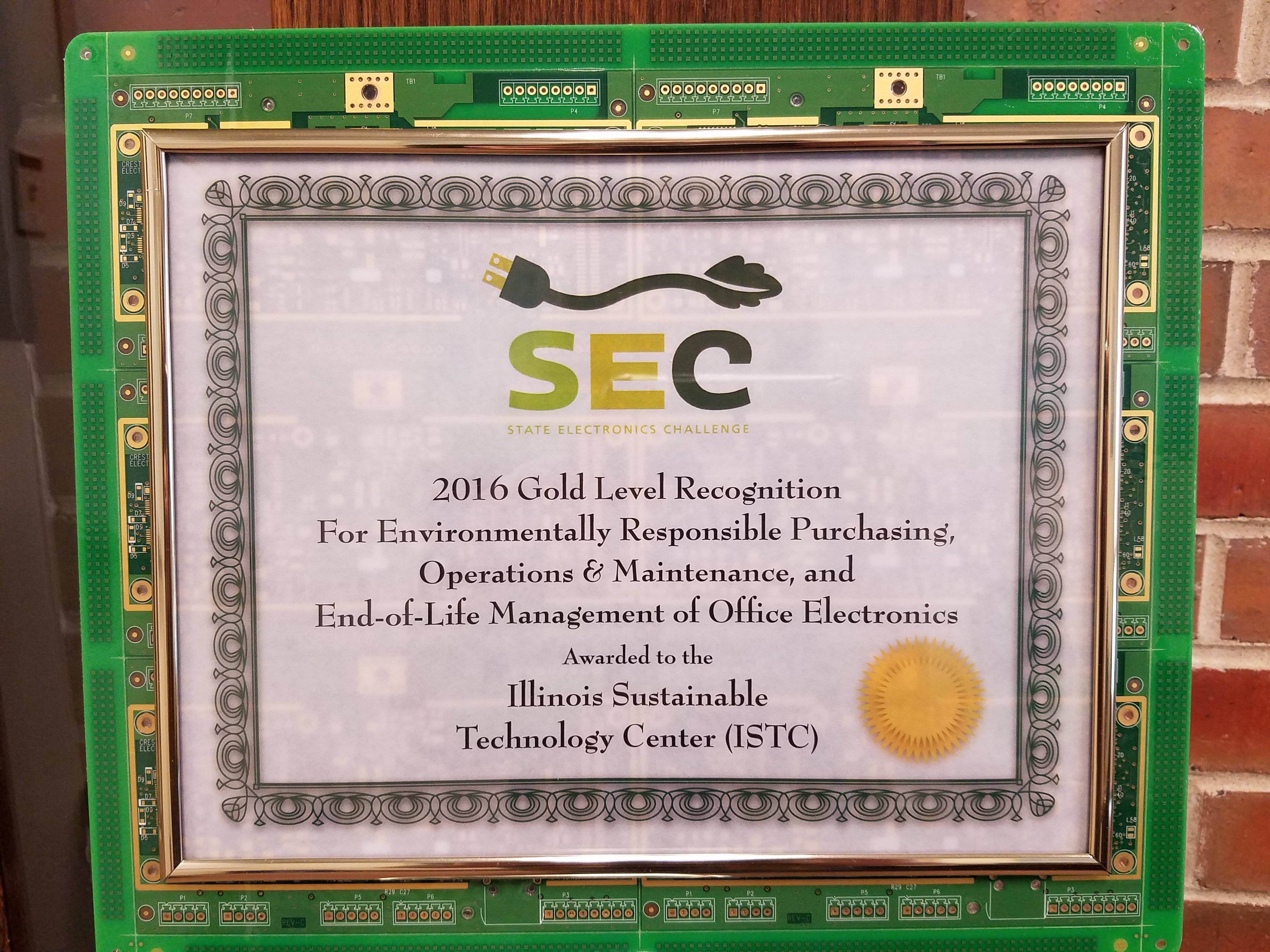The Illinois Sustainable Technology Center (ISTC) has received a Gold Award for its achievements in the State Electronics Challenge–a comprehensive nationwide environmental sustainability initiative that currently reaches more than 223,000 employees in 39 states. ISTC was recognized for its accomplishments in green purchasing, energy conservation, and responsible recycling of electronic office equipment in 2016.
“The Illinois Sustainable Technology Center is truly an outstanding example of a commitment to environmental leadership,” commented Lynn Rubinstein, State Electronics Challenge Program Manager. “This is the third year in a row that ISTC has earned a Gold Award.” She added that “ISTC is one of only 17 organizations nationally being recognized this year and the only one in Illinois.”
“We’re really pleased to have received this recognition, and value our participation in this program,” said Joy Scrogum, ISTC Sustainability Specialist and coordinator for its Sustainable Electronics Initiative and Illini Gadget Garage projects. “The guidance and resources available through the State Electronics Challenge (SEC) were very helpful in creating ISTC’s policy on purchasing, use, and disposal of IT equipment. They also create a useful framework for discussing operational changes in terms of these lifecycle phases for electronics with ISTC’s own technical assistance clients. Even though public entities and non-profits are the types of organizations which may participate in the SEC, I often refer other types of organizations to the Program Requirements Checklist for a simple guide to best practices.”
As a result of its environmental initiatives, in 2016 ISTC saved enough energy to power 42 households per year, avoided greenhouse gas emissions equivalent to removing 68 cars from the road per year, as well as avoiding the generation of 37 pounds of hazardous waste.
The State Electronics Challenge offers its participants annual opportunities to document their achievements and receive recognition for those accomplishments. In 2016, the reported actions of 31 participants in green purchasing of electronic office equipment, power management, and responsible reuse and recycling:
- Prevented the release of almost 219,198 metric tons of carbon dioxide equivalent. This reduction in greenhouse gases is equivalent to the annual emissions from 171,006 passenger cars.
- Saved enough energy to supply 13,722 homes per year
- Avoided the disposal of hazardous waste equivalent to the weight of 2,120 refrigerators
- Avoided the disposal of solid waste – garbage – equivalent to the amount generated by 1,007 households/year.
A full list of winners and their environmental accomplishments can be found on the State Electronics Challenge website (www.stateelectronicschallenge.net).
“The State Electronics Challenge provides state, tribal, regional and local agencies, as well as schools, colleges and universities and non-profit organizations with a great opportunity to integrate concepts of sustainability and waste reduction into their operations,” added Ms. Rubinstein. “It’s inspiring to see programs such as this one developed and implemented at ISTC to ensure that the highest environmental practices are met through the lifecycle of office equipment.”
The State Electronics Challenge awards were made possible through donations from Samsung and the R2/RIOS Program.
About the State Electronics Challenge
The State Electronics Challenge assists state, regional, tribal, and local governments to reduce the environmental impact of their office equipment. It annually recognizes the accomplishments of Partner organizations. The Challenge is administered by the Northeast Recycling Council (www.nerc.org). Currently, 167 state, tribal, regional, colleges, schools, universities, and local government agencies, and non-profit organizations, representing more than 223,000 employees, have joined the SEC as Partners. For more information on the SEC, including a list of current Partner organizations, visit www.stateelectronicschallenge.net.
About the Illinois Sustainable Technology Center (ISTC)
As a division of the Prairie Research Institute at the University of Illinois, the Illinois Sustainable Technology Center (ISTC) helps organizations and citizens implement sustainable solutions to environmental and economic challenges. ISTC’s mission is to encourage and assist citizens, businesses, and government agencies to prevent pollution, conserve natural resources, and reduce waste to protect human health and the environment of Illinois and beyond. ISTC integrates applied research, technical assistance, and information services to advance efforts on a wide variety of sustainability issues and promote sustainable economic development.




